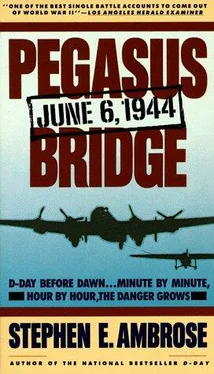Stephen Ambrose - Pegasus Bridge
Здесь есть возможность читать онлайн «Stephen Ambrose - Pegasus Bridge» весь текст электронной книги совершенно бесплатно (целиком полную версию без сокращений). В некоторых случаях можно слушать аудио, скачать через торрент в формате fb2 и присутствует краткое содержание. Жанр: История, на английском языке. Описание произведения, (предисловие) а так же отзывы посетителей доступны на портале библиотеки ЛибКат.
- Название:Pegasus Bridge
- Автор:
- Жанр:
- Год:неизвестен
- ISBN:нет данных
- Рейтинг книги:5 / 5. Голосов: 1
-
Избранное:Добавить в избранное
- Отзывы:
-
Ваша оценка:
- 100
- 1
- 2
- 3
- 4
- 5
Pegasus Bridge: краткое содержание, описание и аннотация
Предлагаем к чтению аннотацию, описание, краткое содержание или предисловие (зависит от того, что написал сам автор книги «Pegasus Bridge»). Если вы не нашли необходимую информацию о книге — напишите в комментариях, мы постараемся отыскать её.
Pegasus Bridge — читать онлайн бесплатно полную книгу (весь текст) целиком
Ниже представлен текст книги, разбитый по страницам. Система сохранения места последней прочитанной страницы, позволяет с удобством читать онлайн бесплатно книгу «Pegasus Bridge», без необходимости каждый раз заново искать на чём Вы остановились. Поставьте закладку, и сможете в любой момент перейти на страницу, на которой закончили чтение.
Интервал:
Закладка:
D Company's role in this defensive phase of the battle was unspectacular. It had none of the excitement, or satisfaction that was inherent in the coup de main operation, but produced far higher casualties. D Company, in short, became an ordinary infantry company.
The process began just after midnight, in the first minutes of June 7. The company marched away from the bridges, pulling the cart loaded with the implements of war behind it. But the cart continually ran off the road, and the swearing. Jack Bailey says, was the most spectacular he ever heard. (And he became a regimental sergeant major in the post-war army, so he heard a lot.) Eventually, D Company gave up on the cart. Every man shouldered what he could, some of the equipment was left behind in the hated cart, and off they marched.
It was a depleted company that marched along towards Ranville. Howard had landed in Normandy twenty-four hours earlier with 181 officers and men. His battle casualties, considering that he had been in continuous action, were remarkably small - two men killed and fourteen wounded. One platoon remained unaccounted for.
His administrative losses, however, had been heavy. After unloading their gliders, and after the Commandos had opened a road, the glider pilots were under orders to go down to the beaches and use their special orders from Montgomery to get themselves back to England. In the afternoon, the pilots had done as ordered, depriving Howard of another ten men.[2] As communications improved between Benouville and the coast, his sappers were taken from him, to rejoin their parent units. That cost almost two dozen men. And as soon as the march ended, he would have to turn over Fox's and Smith's platoons to B Company - another forty men gone. His reinforced company in the early hours of June 6 had numbered 181; in the early hours of June 7 it numbered 76. And when Fox and Smith returned to B Company, Howard's only officer fit for duty was Sweeney. All the others were either dead, wounded, or missing. --- [2] At the beach, Oliver Boland was interviewed by a newspaper reporter and gave a brief account of what happened at the canal bridge. The Times ran the article the next day, giving D Company its first publicity. There would be a great deal to follow.
D Company marched around Ranville. It was dark, there were numerous bends in the roads and a profusion of crossroads, and paratroopers scurrying in every direction. D Company got lost. Howard called for a break, then talked to Sweeney. He was worried that they had not met the regiment yet, and he did want to take the company down the road. 'Will you go ahead with a couple of chaps and see if you can make contact with the regiment, then come back here and report?'
Sweeney set off with Corporal Porter and one private. 'Herouvillette,' Sweeney reports, 'was a very eerie place. There were pigeons going in and out, and parachutists still dangling from buildings, dead bodies.' Sweeney was supposed to turn in Herouvillette, but he missed the turn, wandered about for an hour, finally found the right road, and set off for Ranville and the regiment.
One hundred yards down the road, he saw a dark shape ahead. Motioning for a quiet, careful advance, he moved towards it. There was a clang of a steel door, indicating a German armoured vehicle ahead. Sweeney and his men had practised for exactly this situation during the years at Bulford. Sweeney pulled a grenade, threw it, and started running back towards Herouvillette, while Corporal Porter provided covering fire with his Bren gun.
Sweeney says, 'now the other chap was a big, slow farm lad who couldn't really run at all. He had never done anything athletic and as we were going down the road, he passed me, which I felt very upset about, this chap passing me. I said, "Here, private, wait for me". It seemed to me to be quite wrong that he should be racing past me down the road.'
The Germans, meanwhile, had sprung to life. Tracer bullets were whizzing past Sweeney and the private. Porter kept blazing away with his Bren. Sweeney and the private ducked behind a building to wait for Porter, but the fire-fight continued and Sweeney decided he had to report back to Howard, with or without Porter. Howard confessed to Sweeney that as he had listened to the fire-fight, his thought had been 'My God, there goes the last of my subalterns'.
Sweeney told Howard that there was no point in heading down the road. 'Wherever the regiment had got to it hasn't gone down the road towards Herouvillette and I've just run into an armoured car and lost Corporal Porter.' Howard agreed, saying that they would go back the other way and find the regiment. They did, and discovered that they had never been lost: the regiment had camped for the night in a different location from the one Howard had been told about. He had marched near it twice in the last two hours. It was 0300 hours.
When Howard reported to battalion headquarters, to his great delight he saw Brian Friday and Tony Hooper. They told him of how they had realised they were at the wrong bridge, how Hooper had become a prisoner and was then freed as Friday killed his captors with his Sten gun. They had set off cross-country, through swamps and over bogs, hiding in barns, engaging in fire-fights with German patrols, joining up with paratroopers, finally making it to Ranville. D Company now had twenty-two more men, and two more officers, including his second-in-command. Howard reorganised the company into three platoons, under the three remaining officers.
By 0400, the platoon commanders had put their men into German bunks, then found beds in a chateau for themselves. After two hours of sleep they were on the road by 0630. When it came to the road junction and the left turn towards Escoville, there was Corporal Porter sitting on the side of the road with his Bren gun. He looked at Sweeney and said, 'Where did you get to, sir?' Sweeney apologised but explained that he really had to get back and report.
D Company moved on towards Escoville when they suddenly came under very heavy fire. They took some casualties before setting out cross-country, and finally got to the farm Howard had picked as his company headquarters. He put his three platoons into position and they immediately came under mortar, SPV, tank, sniper and artillery fire. They were being attacked by the 2nd Panzer Grenadiers of von Luck's 125th Regiment of the 21st Panzer Division. 'And these people', Sweeney is frank to say, 'were a different kettle of fish to the people we had been fighting at the bridges'. Casualties were heavy, but D Company held its position.
About 1100 hours, Howard started to make another round of his platoons. Sweeney's was the first stop. Howard began studying the enemy with his German binoculars, 'then there was a zip and I was knocked out'. He had a hole right through his helmet, and there was enough blood to convince the men that he was mortally wounded.[3] --- [3] Howard's helmet, complete with bullet-holes front and back, is now in the museum at Pegasus Bridge. He still bears the scar.
When that word went around in Sweeney's platoon, the men's reaction was to start organising patrols to find and kill the sniper who had shot their Major. In relating this incident, Tappenden commented: 'Every man in the company admired Major Howard more than almost anyone alive. He was a man who knew that if he couldn't do it, you couldn't do it, and you weren't asked to do it. We worshipped him and we wanted revenge'. Fortunately, Howard regained consciousness within a half hour - he had only been creased - and told the men to hold their positions.
By mid-afternoon, the Germans had pushed forward their attack, to the point that there were German tanks between Hooper's platoon and the other two. Orders came down from battalion to withdraw to Herouvillette. The retreat was carried out in fairly good order, considering the pressure and considering that Howard had lost nearly half his fighting strength in half a day.
Читать дальшеИнтервал:
Закладка:
Похожие книги на «Pegasus Bridge»
Представляем Вашему вниманию похожие книги на «Pegasus Bridge» списком для выбора. Мы отобрали схожую по названию и смыслу литературу в надежде предоставить читателям больше вариантов отыскать новые, интересные, ещё непрочитанные произведения.
Обсуждение, отзывы о книге «Pegasus Bridge» и просто собственные мнения читателей. Оставьте ваши комментарии, напишите, что Вы думаете о произведении, его смысле или главных героях. Укажите что конкретно понравилось, а что нет, и почему Вы так считаете.




![Stephen Ambrose - Citizen Soldiers [Condensed]](/books/346737/stephen-ambrose-citizen-soldiers-condensed-thumb.webp)




